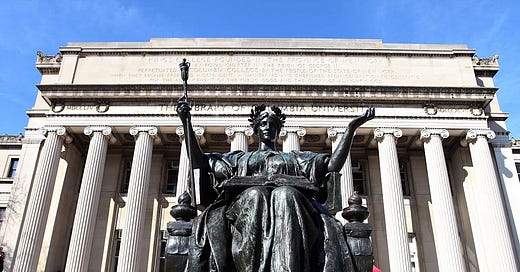
The Free Press

A group of alumni and former professors of Columbia University warn in a new report that the university could stand to lose up to $3.5 billion a year—or up to 55 percent of the university’s annual operating budget—if Columbia doesn’t start cracking down on campus rule-breaking.
The report, published by Stand Columbia Society, a “politically neutral” collective working to restore Columbia’s “rightful pre-eminence in American—and global—higher education,” states the potential financial risks to the university are rooted in Trump and other Republican officials’ “enmity for elite institutions in general, and our alma mater in particular.”
Alexandra Zubko, a 1999 graduate of Columbia and member of Stand Columbia, told The Free Press that the group published the Institutional Risk Exposure report because “we don’t want Columbia to be made an example of.”
The report estimates what might happen if the incoming Trump administration were to accuse universities like Columbia of violating Title VI, the section of the Civil Rights Act that prohibits discrimination on the basis of “race, color, or national origin in programs and activities receiving federal financial assistance,” which would allow the administration to withhold federal funding.
At present, Columbia has at least three active Title VI investigations into antisemitism and anti-Muslim sentiment on campus. Since October 7, 2023, Columbia’s campus has been embroiled in chaotic demonstrations against the State of Israel, prompting the House Committee on Education and the Workforce to conclude in a recent report that the university was “the site of some of the most disturbing and extreme antisemitic conduct violations in the country.”
Put another way, Stand Columbia Society predicts that Republicans may force “an uncomfortable reckoning that we can no longer wish away.” That reckoning—which Stand Columbia believes is possible, if not probable—could potentially cost the university up to $1.33 billion in government grants and contracts that it currently receives, including around $800 million dedicated solely for research.
And it’s not only federal grants that the university could lose if it is found in violation of Title VI.
Stand Columbia warns that $318 million in federal student aid, such as Pell grants or subsidized federal loans, and $785 million in Medicare and Medicaid, which the university receives through its hospital systems, could be in jeopardy, as they also fall under Title VI. Though the authors of the report believe the risk of these particular cuts is low, the report details “the public policy impacts” of what could amount to the crippling of “one of America’s premier academic medical centers.”
What’s more likely, according to the report, is that at president-elect Trump’s direction, the government will limit international student visas, which could lead the university to lose up to $800 million in tuition from foreign students (Columbia currently has over 13,800 international students). Trump may also revive a Republican-led effort in the House to impose a 20 percent tax on university endowments, which, given Columbia’s endowment’s $1.5 billion of gross returns on its endowment investments, could cost the university $296 million. As a senator, Vice President-elect J.D. Vance even suggested imposing a harsher, 35 percent endowment tax.
“An Existential Crisis”
Stand Columbia argues that the budget cuts Columbia and its peers could face, even if carried out on a more limited scale, could turn into “an existential crisis” for them. The group pleads with Columbia’s administration to “avoid being at the ‘epicenter of public outrage,’ ” and calls upon the university’s trustees to step in to simply “enforce our rules” and hold rule-breaking staff and students accountable.

It’s unclear whether this risk assessment—and the potential for significant, existential budget shortfalls—is on the radar of Columbia University and its board of trustees. A representative for Columbia University did not respond to The Free Press’s request for comment.
Republican moves against universities, however, should come as no surprise to university leaders. Donald Trump and J.D. Vance have made clear their disdain for the culture on America’s campuses. Trump has accused these institutions of being run by “Marxist maniacs.” Three years ago, Vance delivered a speech at the National Conservatism Conference titled “The Universities are the Enemy” in which he said, “We have to honestly and aggressively attack the universities in this country” and suggested that it could be “time to seize the endowments” and “penalize them for being on the wrong side of some of these culture war issues.”
And the students do not appear to be making university officials’ jobs any easier. Today, Columbia students, affiliated with an anti-Israel group, posted on Instagram that they planned to “reject” Veterans Day and instead would replace it with a “Martyrs Day” to “honor the patriotism, love of country, and sacrifice of those” who they say were “martyred by the Israel-U.S. war machine.” What followed appeared to be a vigil honoring terrorism.
Dozens of students wearing masks gathered on the main lawn on Monday afternoon and bowed their heads as one of their peers declared over a microphone that “we stand here to honor all our martyrs, those who resisted, whether violently or nonviolently.”
“If this makes you uneasy,” the keffiyeh-donning speaker continued, “ask yourself why.”
Monday’s “Martyrs Day” gathering was a far cry from the chaos of last spring’s semester, which included students camping out on the main lawn, breaking into a building, and even briefly holding janitors hostage. But if Donald Trump and his new administration are looking for excuses to go after the elite universities they’ve long condemned, students appear to be their best allies.
Frannie Block is a reporter for The Free Press. Read her piece “Columbia Custodian Trapped by ‘Angry Mob’ Speaks Out” and follow her on X (formerly Twitter) @FrannieBlock.
For more coverage of the 2024 election, click here.
Become a Free Press subscriber today:



